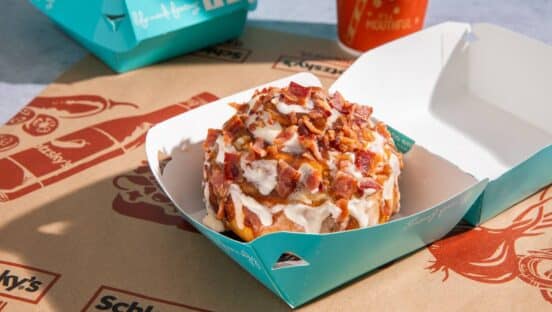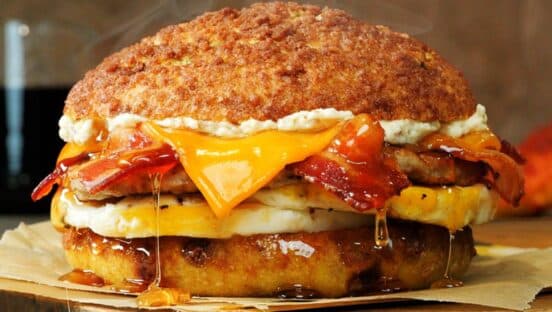Over the past few weeks, I’ve been spending time in London taking in the local food scene. My last trip led me to the incredible Borough Market. For those of you who don’t know, this outdoor food bazaar offers a spectacular mélange of the best food in Europe. Local farmers and artisanal producers sell their products; it’s like Manhattan’s Union Square Greenmarket on steroids. When I visit these kinds of food markets, I feel like Augustus Gloop upon his arrival at Willy Wonka’s Chocolate Factory—I want it all.
As I walked through the Borough, my senses were inundated by smells and tastes. Everywhere I looked, something was tastier and more exotic: salted beef, apple pie ice cream, barbecue, cured meats, fresh foccacia, duck burritos, homemade raviolis, and extra-creamy English cheeses and butters. I became so overwhelmed by the largess of the offering that I ended up trying everything. My boyish glee was replaced by bloat, dissatisfaction, and regret. It was better than falling into a chocolate river, but still not the desired outcome.
CLOSER LOOK
THE MEATBALL SHOP
LOCATIONS: 3
WHERE: Lower East Side; West Village; Brooklyn, New York
ESTABLISHED: 2010
SIGNATURE ITEMS: Meatballs. Classic Beef, Spicy Pork, Chicken, Vegetable, & Special of the Day with sauces such as Classic Tomato & Parm Cream. Available naked, with pasta, with vegetables, and as a sandwich.
A similar scene is playing out over and over again in restaurants throughout America. Let’s look at Taco Bell as an example. The menu offers tacos, burritos, Gorditas, salads, nachos, Chalupas, specialties, desserts, sides, and beverages. Not only does it offer dozens upon dozens of menu items, but it also has multiple menus, such as the Cantina Bell, Drive Thru Diet, and Volcano menus.
The antithesis to this traditional approach comes from the trendier, more guerrilla segments, like pop-up restaurants, food trucks, and small independent operators. Unable to afford the overhead required for a large offering and needing to differentiate their positioning, operators in these segments are trending toward concepts that are ultra specialized. They’re serving things like mini cupcakes, Asian-style hotdogs, Italian Porchetta sandwiches, and Korean tacos. In an extreme example, I was recently at a food festival and drawn to a very busy booth serving only Poffertjes, a mini Dutch pancake. Not necessarily a sustainable business, but very tasty.
My personal favorite specialized concept is the ultra-hip and always-crowded Meatball Shop in downtown Manhattan. Founded by Daniel Holzman and Michael Chernow, the concept focuses on meatballs served with “simplicity and deliciousness.” Once you pick the type of meatballs you want—there are six varieties daily—the only other choice is how you want them prepared: naked (just sauce), on top of pasta, with vegetables, or in a sandwich. These guys don’t skimp on ingredient quality or the other critical areas of their business, but they chose to focus on something they could be “best in the world at,” and it paid off in a big way.
Barry Schwartz’s book, The Paradox of Choice, explains the success of specialized restaurants and products. Schwartz says many business people think offering consumers more choice will satisfy their needs, but this conclusion, though logical, is not accurate. A paradox exists. Excess choice makes the consumer-buying process much more difficult and less satisfying. When consumers see a menu with a breadth of choice, they overthink, change their mind, give up on their purchase, or even worse, regret the whole experience. Nothing is less conducive to repeat business than a dissatisfying spend. The more complex your offering is, the less likely your guests will become customers for life.
Operators that will be successful in the future need to reduce the effort behind making a choice, without reducing the appearance of choice. For example, if you specialize in salads, you could offer two base options—such as a salad and a salad sandwich—alongside an array of toppings and dressings. This is a perfect way to give your customers a choice without confusing them with your offering. You are combining a simple base idea with a choice that is easy to execute and explain. Creating a guided decision-making process will lead to a happier and more satisfied customer.
Jim Collins, the world-renowned business writer and author of Good to Great, said the following: “If you cannot be the best in the world at your core business, then your core business absolutely cannot form the basis of a great company.” As the restaurant business continues to grow globally, specialization is critical to differentiating new concepts and protecting established brands.
Don’t be like Augustus Gloop, flailing down the river helpless and bloated. When you are planning your next move, be like Charlie, simple and good.








